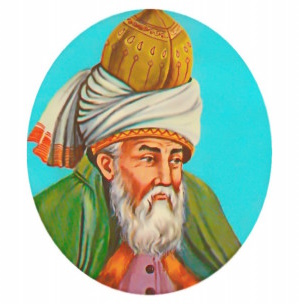"The Mystic Poet - Rumi
In the ancient city of Balkh, where the winds whispered secrets of love and longing, there lived a poet whose verses would transcend the boundaries of time and space, capturing the hearts of generations to come. His name was Rumi, and his legacy would forever enrich the tapestry of human experience.
Born into a world where the mystical traditions of Sufism intertwined with the vibrant culture of Persia, Rumi's early years were marked by a deep longing for spiritual truth. Raised amidst the swirling sands and towering minarets of 13th-century Balkh, he was exposed to a rich tapestry of ideas from a young age, drawn from the wisdom of the Quran, the Hadith, and the poetic traditions of Persian literature.
From the sun-baked courtyards of Balkh's madrasas to the bustling bazaars of Konya and Damascus, Rumi journeyed far and wide in search of spiritual enlightenment, guided by the belief that the quest for God was the highest calling of the human soul. Along the way, he studied under some of the greatest Sufi masters and poets of his time, immersing himself in the mysteries of divine love and mystical ecstasy.
It was here, amidst the swirling dervishes and haunting melodies of Sufi qawwalis, that Rumi's soul soared like a falcon, soaring to the heights of divine union and communion. Drawing upon the teachings of his beloved spiritual guide, Shams-e Tabrizi, he sought to express the ineffable experience of divine love through the language of poetry, weaving together strands of longing, ecstasy, and surrender into a tapestry of words that would resonate with seekers of truth for centuries to come.
Yet, Rumi's quest for spiritual truth was not without its challenges. Living in a world where orthodoxy and tradition often clashed with the ecstatic fervor of mystical experience, he faced fierce opposition from conservative theologians who viewed his poetry with suspicion and mistrust.
Undeterred by their condemnation, Rumi continued to pour forth his verses, guided by the belief that the language of the heart was the truest expression of divine revelation. In his magnum opus, the ""Masnavi-i Ma'navi"" (The Spiritual Couplets), he laid out his vision of mystical love and divine union, offering insights into the nature of the soul and its journey towards God.
As the years went by, Rumi's fame spread far and wide, drawing poets and mystics from all corners of the Islamic world to study his works. His poetry became known as the ""Divan-e Shams-e Tabrizi,"" a testament to the transformative power of divine love and the enduring legacy of Rumi's spiritual quest.
Yet, for all his brilliance, Rumi remained humble, ever mindful of the divine source of his inspiration. His legacy, however, would endure long after his passing, a beacon of light amidst the darkness of ignorance, a testament to the enduring power of love and spiritual longing.
Influence and Legacy:
Rumi's poetry would go on to influence generations of poets and mystics, shaping the course of Persian literature and Sufi spirituality for centuries to come. His verses continue to be recited and cherished by millions around the world, offering solace to the weary soul and guidance on the path to divine love and union.
Yet, despite his monumental contributions, Rumi's name would often be overshadowed by those of later luminaries. It was not until the modern era that Western scholars would come to recognize the depth and beauty of his poetry, whose verses continue to inspire seekers of truth and lovers of beauty around the world.
Today, as we ponder the mysteries of divine love and the yearning of the human heart, let us remember Rumi, whose legacy endures as a testament to the enduring power of love and spiritual longing.
Notable Works:
1. ""Masnavi-i Ma'navi"" (The Spiritual Couplets) - A poetic masterpiece exploring the nature of divine love and the soul's journey towards God, written in rhyming couplets.
2. ""Divan-e Shams-e Tabrizi"" (The Collected Poems of Shams of Tabriz) - A collection of poems expressing Rumi's spiritual longing and mystical experiences, inspired by his beloved spiritual guide, Shams-e Tabrizi.
3. ""Fihi Ma Fihi"" (In It What Is in It) - A collection of Rumi's discourses and teachings on spirituality, offering insights into the nature of divine love and the path to spiritual enlightenment.
Related Scholars:
Rumi's legacy resonated with later poets and mystics, including Hafez, Saadi, and Attar, who built upon his insights and expanded the horizons of Persian literature and Sufi spirituality.
"






Samira Dabo
Delete Comment
Are you sure that you want to delete this comment ?
Amir Al-Farooq
Delete Comment
Are you sure that you want to delete this comment ?
Delete Comment
Are you sure that you want to delete this comment ?
Khadija Toumani
Delete Comment
Are you sure that you want to delete this comment ?
Omar Mahmoud
Delete Comment
Are you sure that you want to delete this comment ?
Delete Comment
Are you sure that you want to delete this comment ?
FaithfulFoundations
Delete Comment
Are you sure that you want to delete this comment ?
Djeneba Sangare
Delete Comment
Are you sure that you want to delete this comment ?
Youssef Nouri
Delete Comment
Are you sure that you want to delete this comment ?
Delete Comment
Are you sure that you want to delete this comment ?
Maryam Hassan
Delete Comment
Are you sure that you want to delete this comment ?
Khalid Malik
Delete Comment
Are you sure that you want to delete this comment ?
Zainab Nasser
Delete Comment
Are you sure that you want to delete this comment ?
Delete Comment
Are you sure that you want to delete this comment ?
futureyqwjcq
Delete Comment
Are you sure that you want to delete this comment ?